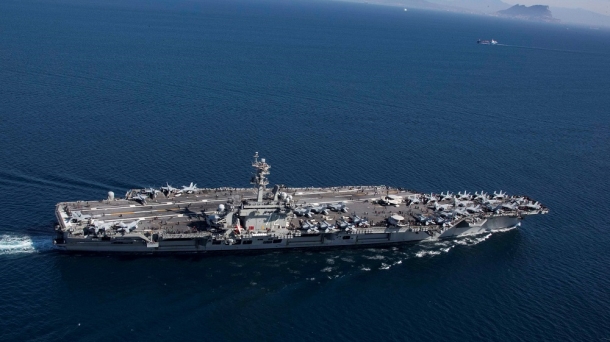
In early May 2019, the United States announced it would deploy an aircraft carrier, B-52 strategic bombers, and a Patriot missile battery to the Gulf region, declaring it had received information that Iran intended to strike US targets or those of its allies, directly or through a proxy. The United States followed with a new round of sanctions targeting Iran’s oil industry.
Although both the United States and Iran say they do not want a direct military confrontation, such escalation by the United States necessarily invites an Iranian response, particularly since Tehran is butting heads with US regional allies like Saudi Arabia and the UAE.
What is the logic driving each party in the current face-off and what options do they have? And should these signs of mounting crisis be taken at face value?
Despite its aggressive posture, the US has said it does not want war, but only negotiations for a new nuclear agreement. Its actions, however, suggest that the Trump administration’s goals vis-à-vis Iran are more sweeping than the former administration’s, aimed at curtailing Iran’s growing military influence in the region, particularly Syria, and countering any threat it could pose to US interests or those of its allies. Some in the Trump administration believe that an Iranian military setback combined with an increasingly ailing economy could spur Iranians to rise up against the regime.
Nor does Iran want war. But chances that the nuclear deal could survive even under US sanctions are looking increasingly slim. Europe has not stepped up to facilitate Iranian oil exports and financial transactions, and even friendly countries like China and Turkey may not be able to break the US sanctions regime long term. Iran thus has few choices and little leverage. It can try to circumvent US sanctions by seeking out new markets, but these are not big and the terms of any deals are likely to be weighted against it. It also has the nuclear agreement itself. Indeed, in response to the recent US announcement that the deadline for universal sanctions compliance had passed, Iran warned the other five parties to the Joint Comprehensive Plan of Action (JCPOA) that it would suspend compliance with limits on its nuclear enrichment if they did not take tangible steps to assist Iran against US sanctions. Most dangerously, Iran has the option of violence. It may decide that the blockade is severe enough to merit an equally severe response—if not aimed at the United States, then at Saudi or Bahraini security targets. Or it could scuttle some of its own ships in the Gulf, blocking the Hormuz Straits, obstructing oil flows, and sending oil over $120 a barrel.
Despite the saber rattling, behind the scenes more conciliatory overtures have been made. US Secretary of State Mike Pompeo has expressed US willingness to accept far less than its public demands, telling the Iraqi prime minister that in exchange for Iran’s withdrawal from Syria, the United States would negotiate an “appendix” to the JCPOA that could usher in a new era of close Iranian-American relations. For its part, Iran told an Iraqi envoy that it is not opposed to an additional protocol, but that sanctions must first be lifted or at least frozen in the interim.
While this demonstrates that both sides are more flexible than public statements would suggest, it does not mean the dangers of escalation are non-existent. The Trump administration believes sanctions can bring Iran to heel, but if that does not work, the US does not have a plan B. While most US leaders, including Trump, do not want war, some within the administration do, and Saudi Arabia and Israel, apprehensive about Iran’s nuclear capabilities, would welcome an armed confrontation. There are hardliners on the Iranian side as well. Opposed to the original agreement, they would certainly resist any additional negotiations. More level heads in the Iranian leadership understand that a war could spell disaster, even if Iran could inflict damage of its own.
Given this, de-escalation is certainly possible: negotiations could proceed on a rider to the nuclear deal and a withdrawal from Syria is not out of the question—Russia is already trying to eject Iran and its militias from the country.
Nevertheless, a real conflagration is also possible, lit by any number of fuses, whether intentionally or due to a miscalculation. Then no one—not the Americans or Iranians, Saudis or Israelis—will come out victorious.
__________________________________________________________________
*This is a summary of a policy brief originally written in Arabic, available here:
http://studies.aljazeera.net/ar/positionestimate/2019/05/190509115922280.html.